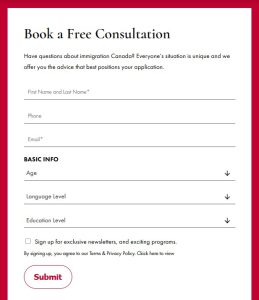
Blog: How To Avoid Canada Immigration Refusal
Canada is one of the most popular destinations for immigrants around the world. With its strong economy, high living standards, and multicultural society, it is no wonder that many people wish to move there. However, Canada has strict immigration policies, and getting a Canadian visa is not always easy. Here are some tips on how to avoid Canada immigration rejection or refusal.

Be honest and accurate on your application
The first and most important thing you can do to avoid Canada immigration rejection is to be honest and accurate on your application. This means that you should provide all the necessary information and documents, and ensure that they are correct and up to date. Any inaccuracies or omissions on your application could result in a rejection or refusal.
Meet the eligibility criteria
Before you apply for a Canadian visa, make sure you meet the eligibility criteria. There are various visa programs available for immigration to Canada, each with its own set of requirements. For example, the Federal Skilled Worker Program requires applicants to have a certain level of education, work experience, and language proficiency. If you do not meet the eligibility criteria, your application will be rejected.
Check the official websites of the programs you want to take.
Provide strong supporting documents
To support your application, you should provide strong supporting documents. This includes documents such as your passport, educational credentials, and work experience letters. It is important to ensure that all your documents are valid, up to date, and genuine. Providing fake or fraudulent documents could result in a refusal.
Provide a clear and concise explanation for any gaps or issues in your application
If there are any gaps or issues in your application, such as gaps in your employment history, it is important to provide a clear and concise explanation. This will help the visa officer understand your circumstances and may prevent your application from being rejected. If you have a criminal record or have been refused a visa in the past, you should also provide an explanation and any supporting documentation.
Seek professional help if you are unsure about the process
If you are unsure about the immigration process or have any questions about your eligibility, it is always a good idea to seek professional help. Immigration consultants and lawyers can provide you with advice and guidance on how to apply for a Canadian visa and increase your chances of success. However, be sure to choose a reputable consultant or lawyer, as there are many fraudulent companies and individuals out there.
Avoiding Canada immigration rejection or refusal requires a thorough and accurate application, meeting the eligibility criteria, providing strong supporting documents, explaining any gaps or issues in your application, and seeking professional help if needed. By following these tips, you can increase your chances of success and start your new life in Canada.

In conclusion:
Being rejected in Canada immigration can be a very disheartening and stressful experience. The process of applying for a Canadian visa is often long and complex, and the disappointment of being rejected can be very difficult to accept.
There are many reasons why someone might be rejected in Canada immigration. It could be due to issues with their application, such as missing documents, inaccuracies, or errors. It could also be due to the applicant not meeting the eligibility criteria for the visa they applied for, such as not having enough work experience or not meeting the language proficiency requirements. Additionally, having a criminal record or being inadmissible to Canada for health or security reasons can also result in rejection.
The consequences of being rejected in Canada immigration can be significant. Not only does it mean that you will not be able to move to Canada, but it can also have an impact on your future immigration prospects. A rejected application may result in a permanent mark on your record, which could make it more difficult to apply for visas to other countries in the future.
The emotional toll of being rejected in Canada immigration can also be significant. Many applicants invest a lot of time, money, and effort into their applications, and being rejected can feel like a personal failure. It can be especially difficult for those who have been dreaming of a new life in Canada and have made plans based on the assumption that they would be accepted.
Despite the challenges of being rejected in Canada immigration, it is important to remember that it is not the end of the road. There are options available to those who have been rejected, such as reapplying, appealing the decision, or exploring alternative immigration pathways. It is important to take the time to review the reasons for rejection and seek professional help if necessary, to understand how to improve your application and increase your chances of success in the future.
Being rejected in Canada immigration can be a difficult and stressful experience. It can have significant consequences and take a toll on an individual’s emotional well-being. However, it is important to remember that there are options available and that rejection is not the end of the road. With the right support and guidance, it is possible to learn from the experience, improve your application, and achieve your dreams of immigrating to Canada.
Do you need professional help with your immigration plans to Canada?
Book a free consultation with us! Let us guide you through your immigration journey.

